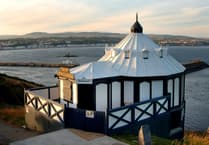Trevor Clark, a retired building air tightness and thermal survey technician, will be writing a new series on saving energy for Green Life.
His columns will inform on the ‘practically possible’ for those interested in finding out where energy leaks from a building and how to slow it from escaping.
It will provide some basic understanding of the building science behind what needs to be done.
He said: ‘My mission is to inform readers of how to reduce the fuel used for heating and improve the comfort conditions within the home, office or workplace.’
When asked why he wanted to do the series, the refrigeration engineer said: ‘I’m passionate about the planet and helping anyone interested in reducing their energy costs and as a result reducing their carbon footprint, while also saving themselves money in the process.
‘I have so much information gained over many years because of my interest in physics, and want to pass this on to a younger generation, which will help anyone with a similar interest or just wants to save heating costs.
‘Now I’m retired so I can justifiably help people in saving energy to save on their heating bills, especially those who are or will be seen as being “energy poor” – something the government accepts but doesn’t acknowledge.’
Mr Clark hopes to ‘get the word out’ and teach people how to reduce their energy use with a number of simple practices.
‘Using DIY information, hopefully we can dispel some myths about current building practices,’ he added. ‘Maybe we can even influence building developers to actually build true energy efficient buildings.’
In this series, Mr Clark will reveal five critical elements to save energy.
He said: ‘We’ll go through each in turn to help you save energy, your pocket, and a little way towards saving the planet.
‘Every little helps, which is never truer that when saving energy in the home.
‘This work will prepare your home for installing a new boiler, not just a heat pump but the other technologies that are about to hit the market in time for 2030, which I’ll cover as well as giving an option for a cheaper version of a heat pump than is currently being pushed by government and heating companies.
The DIY work involved by the performance improvement of the building will not be wasted today, or tomorrow, it will reduce the need for the energy in running a heating boiler with every step you take.
‘Your energy bill will be reduced and your home will have stable temperatures, heat up quicker, cool down slower, be comfortable, have less external sound disturbing you, need less cleaning, have lower bills for the coming years, and prepare the building for a new smaller heating system which should use even less energy and potentially lower heating costs further.
He added: ‘Energy efficient buildings should be built to a similar standard of a commercial deep freeze. However a house needs openings for windows and doors, and this is where the problems arise.
‘For instance, an average new build to 2014 regulations three-bed home has 240 square metres of internal wall area – and through this envelope around 1,200 cubic metres of cold outside air can flow through it, every hour.
‘If that much cold air is getting in, the same amount of warm internal air is getting out.
‘This cold air needs heating up just to maintain the indoor temperature, this will cost about 85p per hour plus the energy to replace the energy lost through the walls, windows, doors, floor and ceiling.
‘To see the cost multiply this by the number of hours your heating is on for and by the number of days you have the heating on for (240 days/year).
‘A new building uses around 50% of the heating costs replacing the energy lost to this air infiltration. Older building can lose double, triple or more than this amount.
‘Yet some simple DIY work can cut this significantly, providing you know what to do to find these energy leaks along with knowing which materials to use and how to use them correctly.
‘Installing insulation is a simple job, but, if the wrong type is used or it’s not installed correctly can be a waste of time and money.’

.jpeg?width=209&height=140&crop=209:145,smart&quality=75)

.jpeg?width=209&height=140&crop=209:145,smart&quality=75)
.jpeg?width=209&height=140&crop=209:145,smart&quality=75)